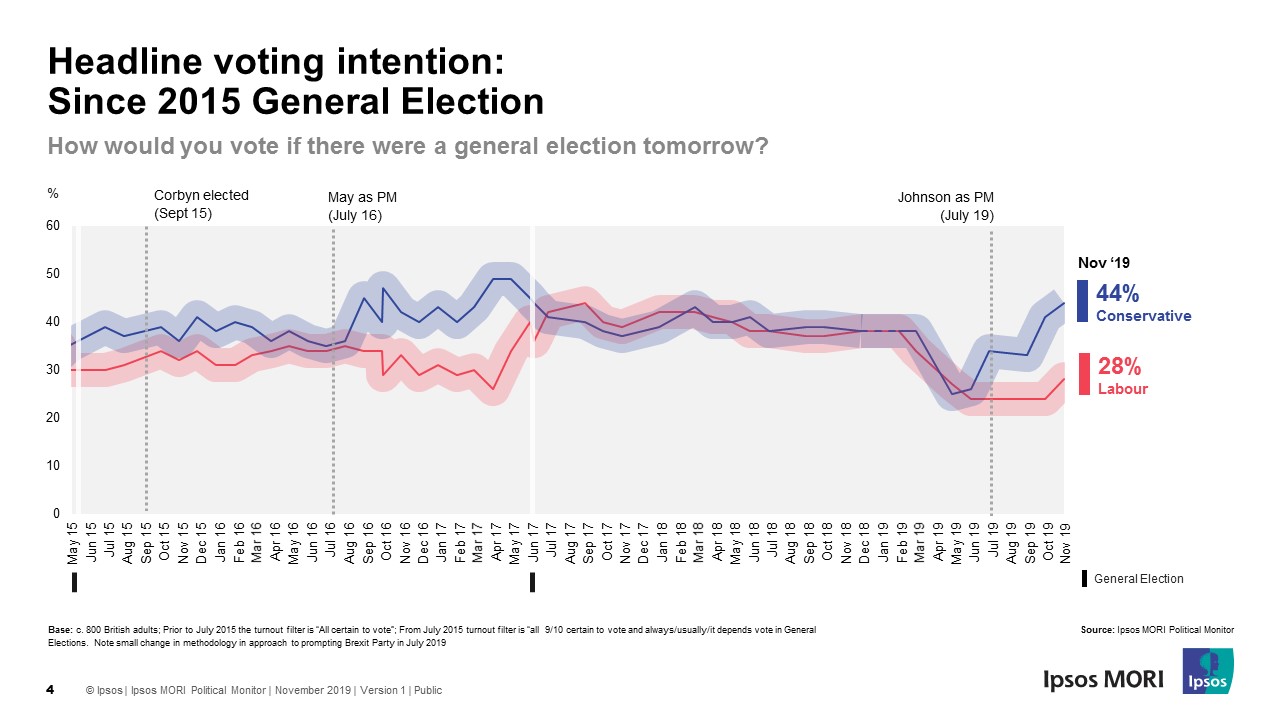Conservatives maintain polling lead but four in ten say they may change their minds
- Brexit and the NHS the biggest issues helping voters decide who they’ll vote for
- Seven in ten say another hung parliament would be a bad thing for the country
The Conservatives maintain a comfortable lead over Labour according to the latest Ipsos Political Monitor. The poll shows the Conservatives on 44%, Labour on 28%, the Liberal Democrats on 16%, the Brexit Party on 3% and the Greens on 3%. These numbers take into account reallocating vote intentions in seats where the Brexit Party, Liberal Democrats, Greens and Plaid Cymru are not standing (see notes below).

Brexit is seen as the top issue helping voters decide which party they’ll vote for with 63% mentioning it (note these are spontaneous, top-of-mind responses, not prompted). Brexit is followed by the NHS (mentioned by 41%), education (21%), taxation and protecting the environment (both 11%), and managing the economy (9%). Brexit is particularly important to Conservative and Liberal Democrat supporters (76% and 77% respectively), while Labour supporters are just as likely to pick the NHS (by 48% to 45% saying Brexit).
The new poll also reveals:
- Three in five (59%) of voters say they’ve made up their mind on who they’ll vote for – two in five (40%) say they may change their mind. In May 2017, 32% said they might change their mind.
- Those who say they’ll vote Conservative are surer of their vote than those voting Labour. Seven in ten (71%) Conservative supports say they’ve definitely decided compared with 54% of Labour supporters. More Liberal Democrats supporters say they may change their mind than are definitely decided (by 60% to 40%).
- Labour voters who may change their mind are most likely to consider the Liberal Democrats while Liberal Democrat voters who may change their mind are most likely to consider Labour (around a third of each pick the other party). Conservatives who may change their mind are split between the Brexit Party, the Liberal Democrats and the Green Party.
- Most Britons (70%) say they’ll vote for the party that best represents their views – slightly fewer what we saw in the run up to the 2017 and 2015 elections (75% in May 2017 and 85% in May 2015). Just 14% say they’ll vote for a party to try and keep another party out (although this rises to 23% of those who say they will vote Liberal Democrat).
- This month, we also asked voters to say how important to their vote were parties, their policies and their leaders, by allocating ten points across each. Party policies is the most important thing according to Britons when deciding how to vote (allocating on average 4.6 points out of 10) while parties and leaders are a joint second (2.7 points on average each). Policies are particularly important to Labour and LibDem supporters, while Conservatives are the most likely to place importance on the leaders.
- Nearly nine in ten (87%) say that it is either very or fairly important to them who wins the election, including 64% who say it is very important. This is the highest ‘very important’ score we have seen at this stage of a campaign.
- One in five (20%) think a hung parliament would be a good thing for the country while nearly seven in ten (72%) think it would be a bad thing. Liberal Democrat supporters are split – 48% think it would be good if no party gains an overall majority, 47% think it would be bad.
Gideon Skinner, Head of Politics at Ipsos, said:
The public are telling us that they care more about the outcome of this election than previous ones, and yet four in ten say they might change their minds – also more than in 2017. At the moment the Conservatives have most reason to be pleased – they keep their lead in voting intentions and their supporters are less likely to say they may change their mind than Labour or the Lib Dems. But there is clearly potential for this to change as the campaign continues.
Technical note
Ipsos interviewed a representative sample of 1,228 adults aged 18+ across Great Britain. Interviews were conducted by telephone 15th – 19th November 2019. Data are weighted to the profile of the population. All polls are subject to a wide range of potential sources of error. On the basis of the historical record of the polls at recent general elections, there is a 9 in 10 chance that the true value of a party’s support lies within 4 points of the estimates provided by this poll, and a 2 in 3 chance that they lie within 2 points. Voting intentions this month are based on all those who said they are registered to vote, and also take into reallocating according to which parties are standing in which constituencies. After being asked the regular voting intention questions, participants who had chosen either the Brexit Party, Liberal Democrats, Green Party or Plaid Cymru were then asked: “And if there was no [INSERT PARTY NAME] candidate in your constituency, how would you vote?”. In constituencies where a participant’s first preference party were not standing a candidate, their answers have been reallocated to their second party preference. Before this reallocation headline figures read: Conservatives 43%, Labour 27%, Liberal Democrats 16%, SNP/Plaid Cymru 5%, Green Party 3%, Brexit Party 4%.






